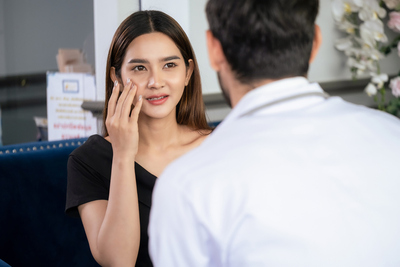Top Questions to Ask Your Dermatology Provider

Achieving healthy, beautiful skin involves learning about your skin. Your relationship with your dermatology provider should be an ongoing dialogue where you gain a deeper insight into the best ways to take care of your skin.
When you next step into your dermatology provider’s office, learn more about your skin with these questions.
Why am I breaking out?
Acne can occur at any age. While teenagers are the ones most often dealing with acne, adults can suffer from breakouts, too.
Adult women tend to get acne during periods of hormonal fluctuation. This can occur during their 20’s and 30’s, during pregnancy, or later in life during their perimenopausal period.
It’s essential to speak to your dermatology provider to determine the best course of action to treat your acne and determine what lifestyle factors might contribute to your breakouts.
Should I be using a retinol product?
Regular use of topical prescription acne medications, such as a retinoid, can help control perimenopausal acne flares. Additionally, retinoids help improve the skin’s appearance and prevent wrinkles, which also concern women during this period of their lives.
“Retinoids, such as tretinoin or adapalene, can improve skin health by evening out skin discoloration, improving the size of pores, and can help prevent fine lines and wrinkles in the long term,” says Dr. Deirdre Connolly of Schweiger Dermatology Group in Garden City and Amityville, New York.
“Prescription-strength retinoids are generally more powerful than those available over the counter. Not everyone can start a retinoid (for instance, those pregnant or breastfeeding), so talk to your dermatologist about this option.”
Can I use a moisturizer if I have acne?
Many believe drying out the skin is the best way to treat acne lesions, but the opposite is true.
When you over-dry the skin, it tries to compensate for the lack of moisture on its surface by producing even more oil. We call this “rebound oil production.”
Avoiding a moisturizer can, therefore, have the opposite effect to the one you want. In fact, applying an oil-free moisturizer before and after your prescription acne medications (a technique called “sandwiching”) can cut down on irritation and redness.
Do I really need an eye cream?
The answer is yes. Moisturizer does not offer the same benefits as many eye creams.
“The skin nearest to the eyes is very delicate and is prone to different problems in aging and environmental exposure than other parts of the face and body. This is why using a separate product – beyond a simple moisturizer – for this area is justified,” says Dr. Rachel Nazarian of Schweiger Dermatology Group.
For your morning routine, look for an eye cream with SPF. “When looking for an eye cream with SPF, the most important thing is to find a sunscreen that uses zinc oxide as the active ingredient,” says Dr. Jeremy Fenton.
According to Dr. Fenton, “Zinc is particularly important around the eyes because the skin around the eyes is very sensitive, and you always risk getting the product in the eyes. Zinc oxide is much less likely to irritate the skin or the eyes than a chemical sunscreen.”
What treatments do you recommend to help my skin look its youngest?
At the Schweiger Dermatology Group, we are fortunate to have groundbreaking new cosmetic tools, and some tried and tested anti-aging methods to help your skin look it’s youngest and healthiest.
From chemical peels and microneedling to Ultherapy, fillers, and wrinkle-relaxing injectables such as Botox, Jeuveau, Xeomin and Dysport, the dermatologist’s office is the best place to go for a suite of non-invasive treatments to rejuvenate, lift, tighten, and tone your skin.
Am I using the correct skincare products?
“With the endless supply of readily available beauty products, I see many patients with skin irritation from using too many different products, some of which are known to induce adverse reactions such as contact dermatitis,” says Dr. Connolly.
“Run your regimen by your dermatologist to see if any of the products you use might lead to skin issues.”
Also, remember that results are not seen immediately with any skincare product.
“It takes time for the skin to respond to the ingredients and show an obvious clinical improvement,” says Schweiger Dermatology Group’s Dr. Rachel Nazarian.
Speak to your dermatology provider about the appropriate product for your skin, and then be diligent about using it for a few months before judging its efficacy.
Are you looking for a dermatology expert who can answer all your questions and more?
Even if you don’t have all the questions, our dermatology experts can give you all the right answers! Schedule a consultation today for a comprehensive skin examination and specialized advice for your skin.
Call Schweiger Dermatology Group at (844) DERM-DOC to schedule a consultation today. To find a location near you, check out our location pages.
